Mercedes EQE VS Renault Master Transporter – Specs, Efficiency & Price Comparison
Which model is the better choice – the Mercedes EQE or the Renault Master Transporter? We compare performance (625 HP vs 170 HP), boot capacity (430 L vs ), efficiency (15.80 kWh vs 25.10 kWh7.40 L), and of course, the price (57600 £ vs 36000 £).
Find out now which car fits your needs better!
The Mercedes EQE (Sedan) is powered by a Electric engine and comes with a Automatic transmission. In comparison, the Renault Master Transporter (Cargo Van) features a Diesel or Electric engine and a Manuel or Automatic gearbox.
When it comes to boot capacity, the Mercedes EQE offers 430 L, while the Renault Master Transporter provides – depending on what matters most to you. If you’re looking for more power, you’ll need to decide whether the 625 HP of the Mercedes EQE or the 170 HP of the Renault Master Transporter suits your needs better.
There are also differences in efficiency: 15.80 kWh vs 25.10 kWh7.40 L. In terms of price, the Mercedes EQE starts at 57600 £, while the Renault Master Transporter is available from 36000 £.
Compare all the key specs now and find out which model fits your lifestyle best!
Mercedes EQE
The Mercedes-Benz EQE epitomises the brand's commitment to luxury and electric mobility, offering a seamless blend of cutting-edge technology and elegant design. Inside, occupants are treated to a sophisticated cabin that combines high-quality materials with state-of-the-art infotainment features, ensuring a refined driving experience. On the road, the EQE impresses with its smooth, quiet ride and impressive agility, making it a standout choice for those seeking both comfort and sustainability.
details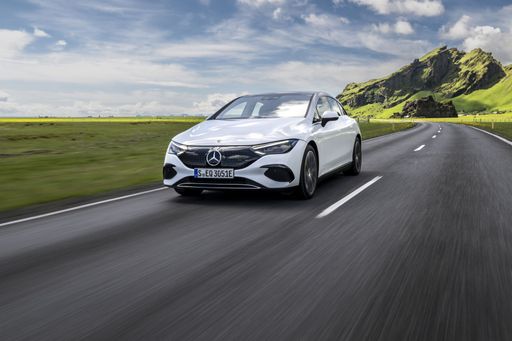 @ group-media.mercedes-benz.com
@ group-media.mercedes-benz.com
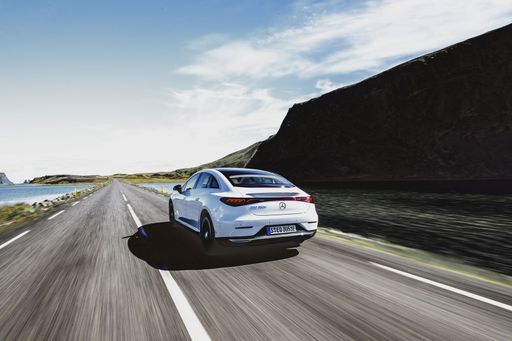 @ group-media.mercedes-benz.com
@ group-media.mercedes-benz.com
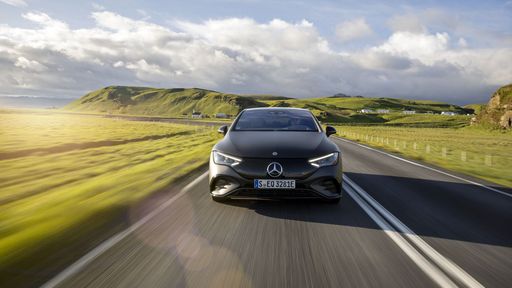 @ group-media.mercedes-benz.com
@ group-media.mercedes-benz.com
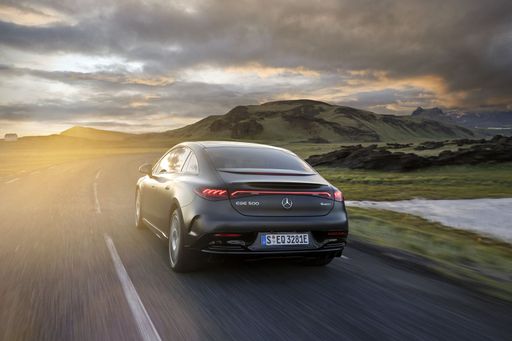 @ group-media.mercedes-benz.com
@ group-media.mercedes-benz.com
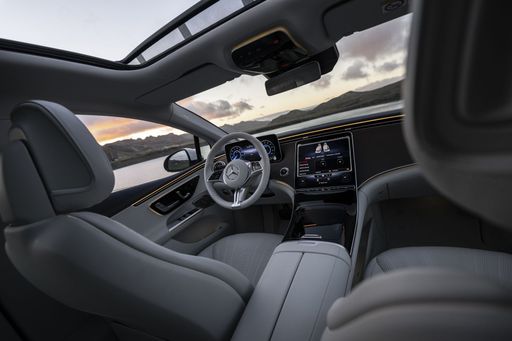 @ group-media.mercedes-benz.com
@ group-media.mercedes-benz.com
Renault Master Transporter
The Renault Master Transporter is a versatile and robust vehicle tailored for a variety of commercial needs. With its spacious interior and ergonomic design, it offers both comfort and efficiency for long hauls. Its reliable performance and modern features make it a popular choice among businesses looking for a dependable transport solution.
details

|
|
|
|
|
Costs and Consumption |
|
|---|---|
|
Price
57600 - 94900 £
|
Price
36000 - 53800 £
|
|
Consumption L/100km
-
|
Consumption L/100km
7.4 - 7.5 L
|
|
Consumption kWh/100km
15.8 - 20.7 kWh
|
Consumption kWh/100km
25.1 - 25.3 kWh
|
|
Electric Range
502 - 691 km
|
Electric Range
406 - 409 km
|
|
Battery Capacity
90.5 - 96 kWh
|
Battery Capacity
-
|
|
co2
0 g/km
|
co2
0 - 198 g/km
|
|
Fuel tank capacity
-
|
Fuel tank capacity
80 L
|
Dimensions and Body |
|
|---|---|
|
Body Type
Sedan
|
Body Type
Cargo Van
|
|
Seats
5
|
Seats
3
|
|
Doors
4
|
Doors
4
|
|
Curb weight
2375 - 2540 kg
|
Curb weight
2128 - 2459 kg
|
|
Trunk capacity
430 L
|
Trunk capacity
-
|
|
Length
4946 - 4964 mm
|
Length
5685 - 6315 mm
|
|
Width
1961 mm
|
Width
2080 mm
|
|
Height
1492 - 1510 mm
|
Height
2498 mm
|
|
Payload
545 - 600 kg
|
Payload
1041 - 1859 kg
|
Engine and Performance |
|
|---|---|
|
Engine Type
Electric
|
Engine Type
Diesel, Electric
|
|
Transmission
Automatic
|
Transmission
Manuel, Automatic
|
|
Transmission Detail
-
|
Transmission Detail
Schaltgetriebe
|
|
Drive Type
All-Wheel Drive, Rear-Wheel Drive
|
Drive Type
Front-Wheel Drive
|
|
Power HP
265 - 625 HP
|
Power HP
105 - 170 HP
|
|
Acceleration 0-100km/h
3.5 - 6.9 s
|
Acceleration 0-100km/h
13.50 s
|
|
Max Speed
210 - 220 km/h
|
Max Speed
90 - 175 km/h
|
|
Torque
550 - 950 Nm
|
Torque
300 - 380 Nm
|
|
Number of Cylinders
-
|
Number of Cylinders
4
|
|
Power kW
195 - 460 kW
|
Power kW
77 - 125 kW
|
|
Engine capacity
-
|
Engine capacity
1997 cm3
|
General |
|
|---|---|
|
Model Year
2024 - 2025
|
Model Year
2024
|
|
CO2 Efficiency Class
A
|
CO2 Efficiency Class
G, A
|
|
Brand
Mercedes-Benz
|
Brand
Renault
|
Mercedes EQE
The Future of Driving: A Look at the Mercedes-Benz EQE
In an era where sustainability meets luxury, the Mercedes-Benz EQE stands as a beacon of automotive innovation. Incorporating cutting-edge technology and an emphasis on electric performance, this sleek saloon is pivotal to the evolution of Mercedes' electric line-up.
Revolutionary Electric Performance
The Mercedes-Benz EQE offers powertrains ranging from 245 to an impressive 625 PS, catering to varying preferences for performance. Its all-electric engine shows a commitment to sustainability while delivering powerful torque between 550 and 950 Nm. These specifications make it a formidable player in the electric vehicle market.
Efficiency Meets Elegance
With an electric range of 502 to 690 km on a single charge and a power consumption between 15.9 and 20.8 kWh/100 km, the EQE is designed for both long drives and city commutes. The sleek design of the sedan enhances aerodynamics, reducing drag and extending range efficiency, while maintaining the elegance expected from a Mercedes-Benz vehicle.
Innovative Features and Technology
The EQE is equipped with a state-of-the-art automatic transmission and a specific reduction gearbox, ensuring seamless power delivery. The interior is packed with technological innovations like advanced driver assistance systems, which elevate the driving experience with industry-leading safety features.
Comfort and Capacity
Inside the EQE, up to five passengers can travel in plush comfort, surrounded by luxurious materials and top-notch infotainment systems. The car offers a 430-litre boot space, accommodating all the needs for a family journey or an executive business trip.
Sustainable Luxury
As an electric vehicle producing zero CO2 emissions, the EQE proudly holds an A-class CO2 efficiency rating. Its price range, from €67,187 to €110,706, reflects the investment in innovative technology and sustainable practices, offering a premium eco-friendly alternative in the automotive world.
Conclusion
The Mercedes-Benz EQE marks a significant stride in the automotive industry, blending performance, luxury, and sustainability. With its impressive range, innovative features, and elegant design, the EQE is a testament to Mercedes-Benz's dedication to electric mobility. It sets new standards for what consumers can expect from an electric vehicle, continuously pushing the boundaries of what is possible in automotive luxury.
Renault Master Transporter
Discover the Capabilities of the Renault Master Transporter
The Renault Master Transporter has long established itself as a leading choice for businesses in need of a reliable and versatile vehicle. With a robust build, innovative features, and a range of engine options, the Master Transporter is designed to meet diverse transportation needs. Whether you’re looking to transport goods or people, this model offers remarkable adaptability.
Power and Performance Under the Bonnet
At the heart of the Renault Master lies an array of powerful diesel engines, ranging from 105 to 180 PS. These engines are not only built to deliver strength but also efficiency, with fuel consumption figures as low as 7.4 L/100km. The Master Transporter manages to strike the delicate balance between performance and economy, making it a practical option for long-distance logistics.
Versatility in Design and Functionality
The Renault Master comes in various configurations to suit specific business needs. With body lengths ranging from 5575 mm to 6875 mm and heights between 2488 mm and 2808 mm, there’s a version for every requirement. The load capacity is impressively versatile, supporting between 873 kg to over 2 tonnes, ensuring that heavy or bulkier items are easily accommodated.
Innovative Features and Technology
Renault has equipped the Master Transporter with advanced technology to enhance the driving experience. The cabin is designed with the driver in mind, featuring ergonomic seating, a user-friendly dashboard, and optional extras such as a touchscreen infotainment system. For added driving efficiency, the Master also includes features like cruise control and rear parking sensors.
Environmental Considerations
While diesel engines are sometimes scrutinized for their environmental impact, Renault has taken steps to ensure that their engines are as clean as possible. The Master Transporter boasts CO2 emissions ranging from 195g/km to 359g/km. Renault's commitment to reducing its carbon footprint is evident in the vehicle's efficient fuel combustion technologies.
Conclusion: The Ideal Business Partner
The Renault Master Transporter is an ideal choice for any business requiring a reliable and cost-effective vehicle. Its combination of power, versatility, and innovative features makes it a valuable asset for daily operations, whether for transporting goods or providing transportation services. With a model range that caters to a variety of specifications, the Renault Master continues to dominate its class.
The prices and data displayed are estimates based on German list prices and may vary by country. This information is not legally binding.
